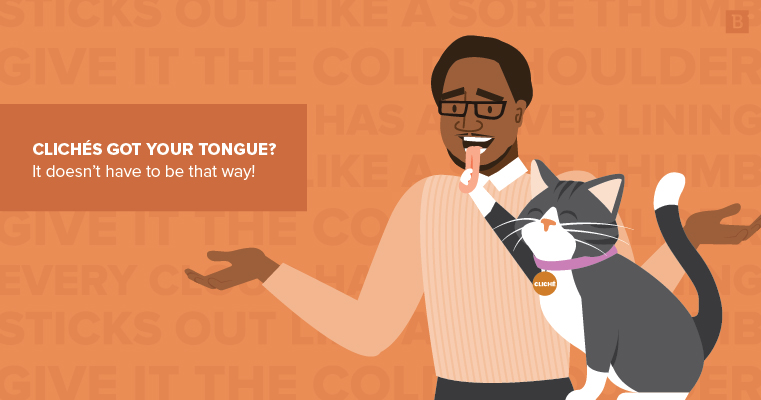Strong writing pays dividends. And one of the art’s deadliest sins vexes and plagues writers of all measures: clichés.
If you skim any listicle of web content writing do’s and don’ts, you’ll likely see a caution to avoid clichés at all costs. Such writing appears lazy to some, and it sticks out like a sore thumb when you use it frequently.
However, you don’t have to give clichés the cold shoulder. Every little bit of hackneyed language has a silver lining. The key to including cliché phrases is to use them in fresh, surprising ways.
Why are clichés cliché?
Sometimes, it’s hard to avoid clichés. They seem so clever. Plus, we often say them without a second thought.
But if they’re so popular—or inescapable—why the hate that reaches Nickelback levels of contempt?
Well, like the meme of unexplained but intense hatred toward the Canadian rock band, clichés once swept the nation. And if you think that many of them sound clever, you’re not wrong. They were clever.
WARNING: if you see tweets offering free clip of the new Nickelback album DO NOT CLICK. It links to a free clip of the new Nickelback album.
— Michael O’CC (@michaelocc) September 9, 2011
So how did they fall out of favor? The same way “up high, down low, too slow” grew stale: We loved them too much. We had too much of a good thing. Language is beautiful, and when we latch onto a phrase, we don’t let go until we’ve sucked out all the life, especially when someone throws words on a nature image with an Insta filter.
In fact, their designation as clichés shows the masses believed these phrases were once the cream of the crop. With that said, they deserve their respect, and your content offers that recognition by helping tired phrasing evolve into something fun and new.
When do clichés make for poor writing?
Hackneyed language can appear in everyday usage and industry-specific buzzwords. Here are some examples of both:
General
These phrases are ones you may hear often in normal conversation. Additionally, you may notice certain clichés are more common among your older friends and relatives, who experienced the time when such sayings were fresh.
- All of your eggs in one basket.
- Avoid it like the plague.
- Calm before the storm.
- Every rose has its thorn.
- Fit as a fiddle.
- In someone’s/something’s crosshairs.
- In full swing.
- In the nick of time.
- On the front lines.
- Right as rain.
- Stand out from the crowd.
- The devil is in the details.
Not only do these phrases feel familiar, but they can also make your content writing vague. For instance, what about fiddles makes them fit? Since when did musical instruments start pumping iron?
Scenarios can also include cliché structures. Think of some recent rom-coms you’ve seen. How many times does the man hide a secret from the woman? Of course, she finds out, is angry and ends the relationship. The third act covers the revelation of the man’s reasonable—or in the case of She’s All That, unreasonable—reasons for deception, the two make up because they love each other and everyone lives happily ever after.
Marketing
After writing your 50th blog on why businesses should consider leveraging managed IT services, it’s no surprise if you start slipping in a few marketing clichés. While these phrases aren’t necessarily hackneyed among your friends and family, they’re ones your colleagues likely hear and use often, especially if your desk is near the business development folks.
- Bandwidth.
- Best-of-breed.
- Bleeding-edge.
- Cut through the noise.
- Disruptive.
- Hacks.
- Influencer.
- Improve the bottom line.
- Low-hanging fruit.
- Move the needle.
- One-stop shop.
- Think outside of the box.
Structural clichés are a problem in marketing copy, too, especially in case studies. Do you even have enough fingers and toes to count the number of times you’ve seen the problem-solution-results format?
If you really want to cut through the noise, the first step is to stop making the same sounds as everyone else. You do that by letting the competition bog down their copy with tired phrases while you throw a wrench into the status quo.

When do clichés make for exciting writing?
When you’re hot, you’re hot. And when you’re not, you’re year’s old, freezer-burned ground beef.
That’s wisdom and an example rolled into one. While maybe a bit jarring or confusing, those two sentences show the key step in making clichés interesting: creating surprise by subverting expectations.
Clichés are everywhere, and we expect them and where they’ll go. So get readers in a rhythm with a few fast balls, and then throw them a curve ball to keep things interesting. Here are some strategies you can use:
Flips
One easy way to give new life to a cliché is to transpose its parts. For instance, why shoot fish in a barrel when you can shoot barrel in a fish?
The other kind of flip involves negating the phrase. Are your sales slow? Seems like your products are selling like cold cakes!
Here is an example of this strategy in action from Old Spice:
Look no further. The Old Spice movie you’ve not been looking for is not here: https://t.co/WE6m9GgABo pic.twitter.com/rIUhSqd09G
— Old Spice (@OldSpice) August 24, 2017
In recent years, the brand has moved from its “your dad’s scent” perception to the energetic and active persona it has now. As part of its launch of Invisible World, its “full-length invisible movie that you can’t actually see” to promote an invisible spray antiperspirant, Old Spice published a tweet that flips cliché language from movie trailers.
Calling to phrases like “the summer blockbuster you’ve been waiting for,” Old Spice humorously negates the language to make a joke about the fact that there’s nothing to see when you watch the video.
If that brilliance isn’t enough to get current and future customers to mostly listen during a two-hour gimmick film, what is?
Substitutions
Going a step further, take one element of a cliché and replace it with something readers will never see coming.
Consider an LED light bulb manufacturer. Readers can take only so much information on how LEDs are 90 percent more efficient than incandescent bulbs. Wow them with something like “with great power comes great rises to your energy bill.” You might even be able to snag a lead among the Toby McGuire Spiderman fans.
How about a stock market advisory? Give readers a giggle with “cat got your return on investment?” It’s fresh and relevant.
Check out Dollar Shave Club, which is a master of the substitution:

This brand took advantage of a familiar quote from Yogi Bear that sometimes finds use among human folk who want to remind someone they weren’t born yesterday. After listing five actual product benefits, Dollar Shave Club concluded its list with a fun description.
In this case, it swapped out the last word in “smarter than your average bear” to make use of the familiar phrase, connect with buyers who grew up watching the Hanna-Barbera classic and hype up its product.
Puns
Any dad joke fans reading this? Well, you don’t need to be a dad to throw a solid pun or two into your content to beef up cliché writing.
Want to convince readers to check out an emerging thought leader who doesn’t have the reputation of one of your industry’s top dogs? Tell them to read between the bylines! Did you come up with an amazing pun in an otherwise terrible first go at an article? Sounds like you have a diamond in the rough draft.
Beyond your friendly neighborhood dad, you can also look to Charmin for excellence in the pun game:
Charmin tells the truth, the hole truth, and nothing butt the truth. #EnjoyTheGo pic.twitter.com/k4IqYJETTp
— Charmin (@Charmin) May 17, 2018
With a toilet paper brand, one can only imagine how it could incorporate puns into its marketing efforts. With this tweet, Charmin took a humorous but almost family-friendly approach to the oft-heard “the truth, the whole truth and nothing but the truth, so help you God” language that accompanies sworn testimonies.
While subtle, the changes tickle our funny bones not only for their reference at toilet humor but also when we consider the typical context in which we hear the actual phrase. (Looking at you primetime crime dramas.)
How can you get the gears turning?
They key to strong cliché use is surprise, and as you can likely surmise from the examples, humor is also a good bet.
As with any writing tool, less is more, even when you’re pulling out all the stops to create a few flips, substitutions and puns. So unless you’re laying it on thick for an article about good and bad ways to use clichés, go for a light touch.
Otherwise, let tired language go the way of the dinosaurs.




